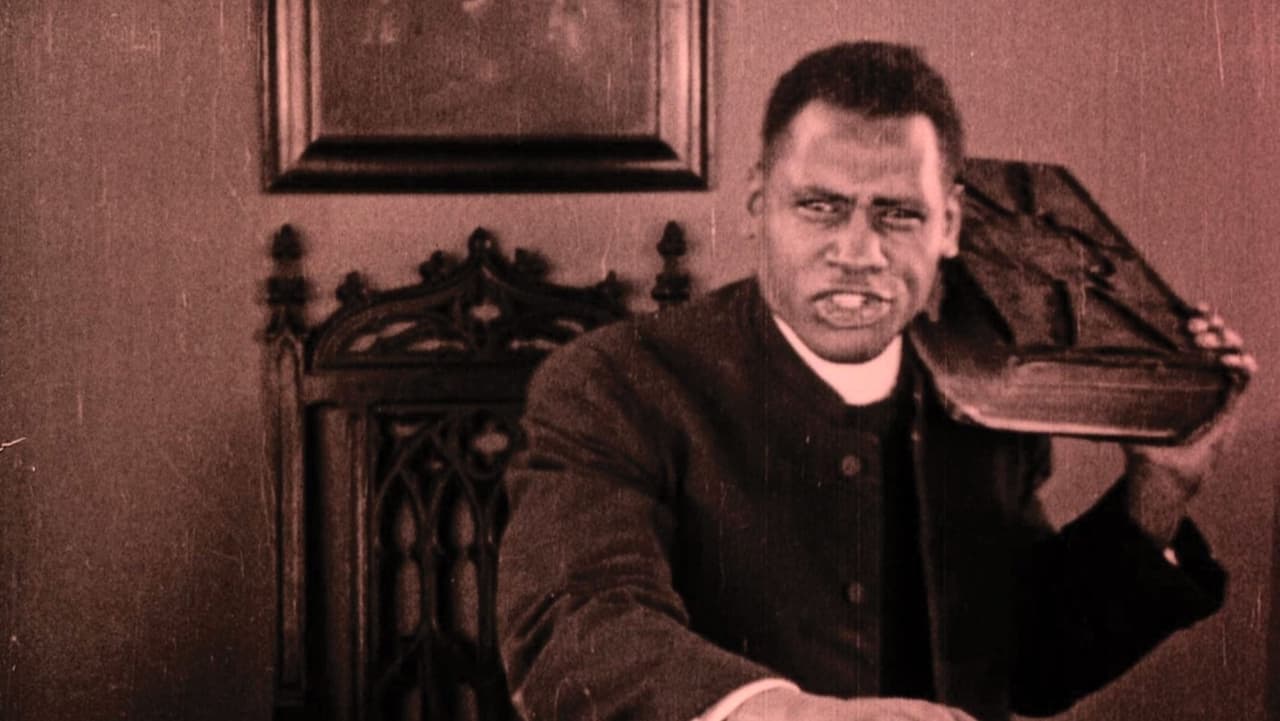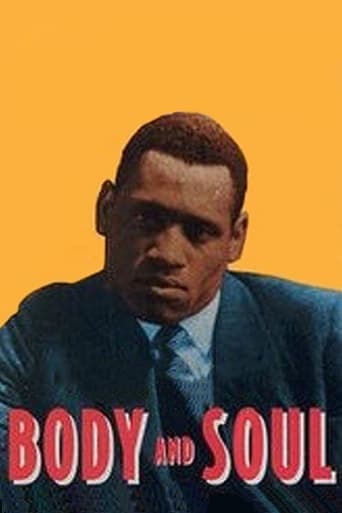

Excellent but underrated film
... View MoreIt's fun, it's light, [but] it has a hard time when its tries to get heavy.
... View MoreA Brilliant Conflict
... View MoreIf you're interested in the topic at hand, you should just watch it and judge yourself because the reviews have gone very biased by people that didn't even watch it and just hate (or love) the creator. I liked it, it was well written, narrated, and directed and it was about a topic that interests me.
... View MoreBODY AND SOUL (1925) is the third of Oscar Micheaux's surviving silents, with a cast exclusively comprised of African-American actors. It tells the story of Isaiah Jenkins (Paul Robeson), a phony reverend who preaches to a congregation in a small town in the American South, who is really an escaped convict. The locals look up to him, including Martha Jane (Mercedes Gilbert). Martha tries to push her daughter, Isabelle (Julia Theresa Russell) into marrying the reverend, even though she is already seeing his twin brother Sylvester (also played by Robeson). Isabelle, though, sees that he is not as pious as he appears to be. An incident takes place between Isaiah and Isabelle that drives Isabelle away from home, and Martha Jane is forced to confront an unpleasant truth she never would have imagined...I felt that this was the best of Micheaux's surviving silent movies. The narrative is straightforward and easy to follow, without being burdened by excess characters or lengthy explanations. As was common with many silents, there are some melodramatic contrivances at times but nothing really insulting. Micheaux's narrative here is well focused and a flashback scene makes the movie more powerful. Paul Robeson is the main standout here, with a very charismatic performance as the fake preacher, alternately charming, intimidating, and aggressive – his acting is very expressive. Mercedes Gilbert, a famed black stage actress of the time, also does some nice work as the mother who has to accept that appearances can be deceiving. Some of her gestures and expressions are very much of her time, but she still projects a magnetism and emotional sincerity that makes her work convincing. Julia Theresa Russell is a bit more low-key, quite naturalistic in her portrayal.Micheaux has some very effective camera-work here, particularly in the flashback scene which conveys disturbing events well with just a minimum of imagery and skillful editing. Not all of the editing here is superb, though – there are a few awkwardly staged moments, like a poorly choreographed fight scene and occasional repetition of action. However, despite that, the movie has an abundance of outstanding scenes.BODY AND SOUL is, in conclusion, an advance over Micheaux's previous silents WITHIN OUR GATES and THE SYMBOL OF THE UNCONQUERED. It succeeds because of a focused, straightforward story, charismatic performances, and skillful production. SCORE: 8/10
... View MoreConsidering that this film was an all-black production with a very low budget, the results are surprisingly good. After all, many films made by the black community to be viewed by the black community were pretty dreadful affairs--mostly due to the incredibly poor production values. Here, however, Oscar Micheaux manages to make a film that is better than most mainstream films of the day. Part of is that he got a lot out of his cast and the money used to make the film and part of it is because the plot was so daring--and very ahead of its time.Paul Robeson (in his first film) plays a horrible man. He is a con-man and poses as a preacher to bilk decent people out of their money. And, on top of that, he's a hard-drinking man who is not above using and destroying women in the process. For much of the film, his evil ways go undetected and he's seen as a pillar of the community. However, late in the film he goes way too far and his actions result in the death of a woman who inexplicably loved him. He is confronted with his evil near the end and this was very exciting. Unfortunately, this very modern and cynical look at church charlatans ran afoul of censors and Micheaux unfortunately was forced to tack on a bad ending that detracted, a bit, from the impact of the overall film.Despite not getting a chance to hear Robeson's gorgeous voice since this is a silent, it did give him a great chance to show he could act--and act very well. In fact, of the many all-black productions I have watched, this has some of the best overall acting. Sure, there are a few silly characters here and there--but not many. Most are quite believable. There are a few minor quibbles about the film--apart from the ending. First, Robeson's character is not introduced well. Instead of seeing him live like the devil, the intertitle cards at the beginning tell about him--too much really. Second, the woman dying was clichéd. You don't just die of a broken heart and it could have been done in a much more believable manner--such as a suicide or having him beat her to death. Still, compared to all the films of the day, it was a wonderfully made film--and well worth seeing.
... View MoreThis was a good movie! I just saw it for the first time. I've never ever really sat down to watch a silent movie not to mention a "race film" made by a black producer back in the 1920's. I was impressed yet at the same time distraught by the stereotypical overtones. Being a man born in the 50's the written dialog was a bit challenging to decipher. However, I did enjoy the chance to interpret what I was seeing and not be forced to feel or react to things like most films do today.I enjoy films made by black producers because they often carry historical inferences but sadly still adorned with stereotypes. Nowadays it seems to be all about special effects, graphical imagery and money. Micheaux's "Body and Soul" doubtless was also about money because he had to pay bills too, but it's obvious he was into his craft. You can see this from the acting and storytelling. It emanated the typical and cynical parody of life which has manifested throughout generations. This film didn't need special effects to be appreciated or tell the story. The emotional acting of Isabelle (Mercedes Gilbert), the daughter, was impressive and a major faction of the film. The animated deceitful behavior of the reverend (Paul Robeson) along with well emphasized facial expressions was very entertaining. The mother's acting (Julia Theresa Russell) was descent. The ending was questionable. It moved the film into a completely different direction? Can't figure that one out? Maybe it was Micheaux's mind working the "What If?" factor.Micheaux, obviously no Alfred Hicthcock, I can see had to avoid subversive film-making to implore the white film industry with their vision of blacks. I'm sure if he were alive today I'd say, "Oscar, there's no reason for you to feel shame or disgrace having to produce films that way because things aren't so different now. They may seem to be, but still the same."
... View MoreSome very good films have been made which could be described as talky. I'm a huge fan of Woody Allen, for example, and most of his films are quite talky. And that works for Woody, largely because his films feature sound. But in a silent film like Body and Soul, long static scenes of characters sitting and chatting tend to be a bit dull.The acting, with a couple of female exceptions, is quite good and quite understated for the era. Paul Robeson, in particular, is very effective as the menacing preacher man--that is, his facial expressions are effective, but his body language is stiff and constricted, as though a chalk X had been drawn on the floor and he'd been directed to stand on it and not move, probably to save the cameraman the effort of moving.A handful of creaky pans are all the camera movement we get in Body and Soul. The camera seems absolutely bolted to the floor. The compositions are crude, with the subject of interest generally being dead-center in the frame. It's all very reminiscent of those old tableaux-style films from two decades earlier, except for the editing.As if to compensate for the lame camera work, Micheaux edited the crap out of this film. I didn't do the count, but I'd guess there were about 2-3 times as many cuts as in a typical non-Russian film from 1925, and that would be great if there were some rhythm to it, some reason for it, but it seemed like Micheaux was cutting for the sake of cutting--awkward pointless jump cuts galore. Some of his choices were downright bizarre, most particularly his rampaging, out-of-control use of cross-cutting. He'd cut away repeatedly from some dramatic scene to show us one of his other characters sitting in a chair someplace completely else, staring, or combing his hair, for no reason I could determine. Perhaps he just wanted to keep a handle on his characters in time, check in and see how everyone was doing. Another thing that annoyed me was that the Yello-Curly character was introduced very early in the film as if he was going to have some important function. He was developed a bit, and then suddenly disappeared without a trace. Disappointing, because he was one of the most interesting characters in the film--and one of the ugliest and oddest-looking humans I've ever seen.Despite the many flaws, this story still could have been interesting. An evil manipulative preacher. A mother who probably subconsciously realizes that her daughter is being raped and abused, but who refuses to acknowledge it, or to even listen to her daughter on the subject of the preacher. Although the preacher and the daughter were not blood-related, there were incestuous overtones. In a way, it kinda reminded me of Laura Palmer's story in Twin Peaks. And then just when the story was becoming gripping and tragic, and I was getting into it, Micheaux pulled the rug out from under me. He ended with the worst kind of hackneyed cliche, the kind of ending that was probably boring and stupid even in 1925.Body and Soul is of some interest, probably, as an historical document, but it's not a good watch, and I can't rate it any higher than a 4/10.4/10
... View More